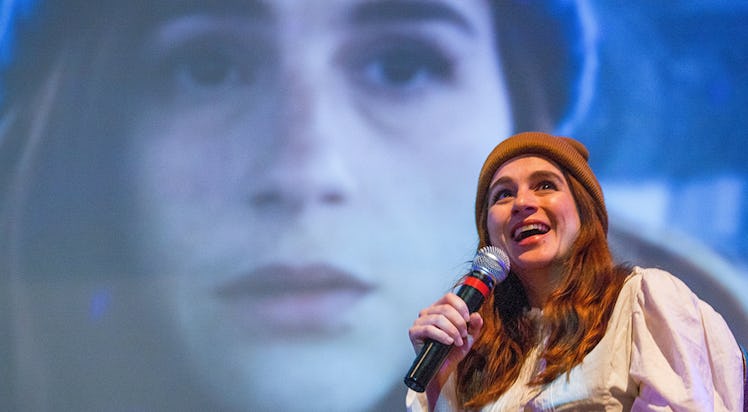
'You're The Worst's Aya Cash Explains The Impact Of #MeToo On Her Career — EXCLUSIVE
In a European-style ski town that sits at the base of a mountain 100 miles west of Denver, the 15th annual Vail Film Festival, which took place April 5-9, places the role of women in the industry as its central focus. There is lots of talent on display, but there's one person who's particularly open about her thoughts. When actress Aya Cash explains the impact of the #MeToo movement on her career, she is extremely candid and measured, conscious of finding the most precise words, not the "right" ones.
"It's a very confusing time to figure out what the next step is," the 35-year-old actress admits in an interview with Elite Daily. "Like, do we overcorrect, so that we can get to the right place?"
Here in Vail, Colorado, women in film are highlighted at the festival for a second straight year, a decision inspired in part by the explosive stories that highlighted the #MeToo movement. So it's inevitable that Cash has been asked about related subjects: #MeToo, the "Time's Up" campaign, their affect on the industry from which many of the stories stem, and the role of women in film.
Standing on stage at the festival with Molly McGlynn, the director of an award winner at the festival, Mary Goes Round, Cash says there's reason for optimism. "You know what's funny?" she asks a moderator rhetorically, "I did a lot of first-time filmmakers movies last year ... almost all of which were [by] women, which is such a good sign for our industry."
A day later, in one-on-one conversation with Elite Daily, she adds in the finer print. "That's also not universal. Obviously Molly and I are white women who come from a place of privilege, and that's a whole other ball game. So I don't want to sort of speak as if [to say], 'we're all good,'" she says.
The numbers back her up.
A study from the Center for the Study of Women in Television and Film at San Diego State University shows that of the 100 highest-grossing films in 2017, 24 percent had lead characters that were women. Another study sponsored by the center at San Diego State shows that women made up 18 percent people who worked behind the scenes (directors, producers, etc.) on the 250 highest grossing films of 2017.
It is that notion that the numbers reflect — that there is a disparity between female talent capable of working in film and the amount who are actually employed — that can add insult to the injury that is the wave of sexual assault stories in Hollywood.
Those same stories, and the reactions they have elicited, have prompted Cash to revisit what is and is not true about show business, and which concessions are actually necessary. By her own admission, the Wolf of Wall Street actress thought the state of the industry was "fine," despite the feeling that there was a demand for women to double as both actress and accessory.
"This last couple of years, I think a lot of people have had to start looking at everything differently," Cash says. "So while, three years ago I might've been like, 'it's fine,' I have to look back and go, 'is it fine?'"
Now, she's not so sure.
"There's been times where I've bought into that demand of needing to be a certain thing or look a certain way or feel like I have to participate in order to get what I want, which is work. I've disappointed myself in those moments but I was kind of, like, well that's what I have to do right, right? And now I don't know if that's true."
What does seem unquestionably true is that the independent film industry appears ahead of the curve in highlighting concerns about a gender disparity in Hollywood.
Thursday, April 12, marked the start of the Atlanta Film Festival, a 10-day event dubbed the "#MeToo fest" by the Atlanta Journal-Constitution, for its promise to serve as "affirmation of the power of women’s voices and stories in an industry that has often rejected them." A weekend earlier, the Vail Film Festival did the same. And, according to the aforementioned San Diego State study, independent films account for 65 percent of movies with female leads.
No doubt, the cynic might worry about the type of "over-correction" that Aya Cash mentions, a reaction to disproportionate practices that is, in itself, disproportionate. But the organizers in Vail argue that their efforts are about something more simple: recognition.
"The mountain that we have to climb is not new. So it's just nice for it to be out there and we can talk about it," Megen Musegades, a filmmaker and executive director at the Vail Film Festival, tells Elite Daily. "It's not like we're doing a women in film festival because women aren't good enough to compete with the others ... we're recognizing women just so that they have the opportunity that otherwise passes them by."